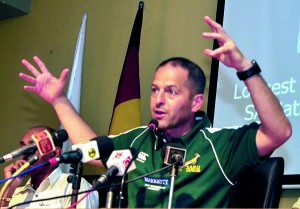Ninety per cent of Lankan referees have faced assault – Kaplan shocked
Renowned veteran international rugby referee, Jonathan Kaplan, who took over officiating duties at the first leg of the Bradby encounter last week, expressed deep concern toward the situation of referee harassment, labelling the abuse absolutely unacceptable and unjustifiable.
“If a referee knows that he is under threat there is no way he can go out there and do his job properly. There should be absolutely no reason why a referee should be exposed to violence,” he sternly declared.

Kaplan stresses a point. Pic by Amila Gamage
“In rugby you need three basic things: a ball, players and referees. So without them you basically have no game.”
The South African, who is the most capped international referee of all time with 13 World Cup appearances, 105 Super Rugby outings and 411 first class games to his credit, also drew comparisons between the ways referees were treated in cricket, the country’s most popular sport and rugby, its fastest growing one. He urged officials to find ways to replicate the same respect afforded to cricket umpires, on the rugby field.
Kaplan revealed that while in Kandy for the Bradby, he had spoken to a number of referees there and he had shockingly discovered that “about 90 per cent” of them have been assaulted at matches.
He made these remarks while speaking to club and school rugby officials at a SLRFU-convened forum discussion aimed at addressing the issue of violence toward referees. In recent weeks this problem has escalated to an all-time high, with school referees who have been verbally and physically abused by spectators, players and coaches refusing to control games unless certain preconditions are met.
He directed many questions at several club and school rugby coaches present at the event in a bid to discover and work past problems they had with the country’s referees.
Although it was unanimously agreed that there were no circumstances that would justify the assault of a referee, numerous officials pointed out that they were not entirely comfortable with the standard of refereeing at many matches and this in turn was generating frustration. The issue of discontinuing with the current school league, which they allege has created an increasingly hostile and highly competitive environment, and only playing friendly matches was also discussed at length.
However, there was a noticeable lack of school rugby administrators at the discussion, with only a fraction of the schools, involved in the various leagues, represented.
Among the many proposals put forward were an increased role by the match commissioner and home team with regard to referee security and the initiation of programmes that would nurture referee development, such as earmarking exemplary young referees and rewarding them with foreign training. Throwing his voice into the mix, Kaplan suggested that spectators too should be properly educated on the laws of the game and proposed the initiation of action which would aid this process.
There were also calls from members of the audience for rugby authorities to take a more active stand on the issues surrounding local referees, in order to prevent matters from spiraling further out of control.
Follow @timesonlinelk
comments powered by Disqus


